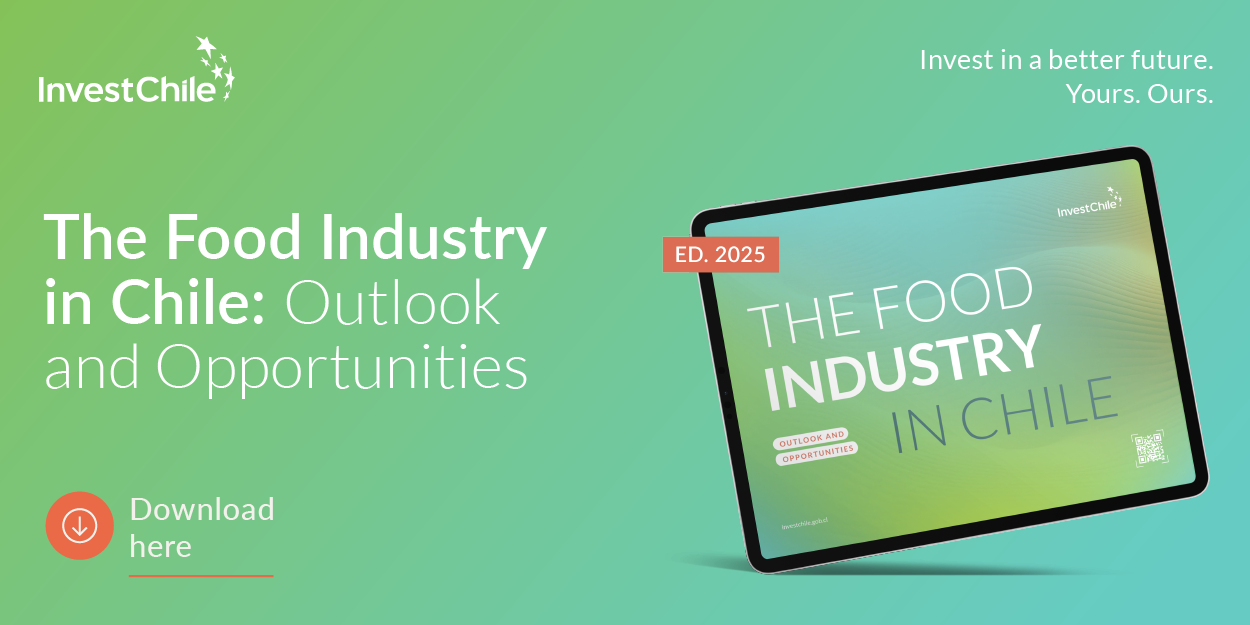From functional ingredients to sustainable packaging and innovative aquaculture, Chile offers unique competitive advantages for companies in the global food sector.

The world is facing increasingly complex challenges in food security, sustainability, and nutritional health. Against this backdrop, Chile is emerging as a strategic partner for global companies looking to invest in a dynamic, innovative agri-food sector that is well-connected to international markets.
Thanks to its diverse agroclimatic conditions, robust institutions, open trade policies, and innovation ecosystem, the country offers concrete opportunities in key areas such as functional ingredients, healthy foods, sustainable packaging, agtech, and aquaculture.
If you’re considering new locations for your operations or looking to expand your presence in Latin America, Chile opens the door to a competitive market with targeted incentives and support for foreign investors. Download our new e-book “Food Industry in Chile 2025” and discover how to become part of this transformation.
An industry in transformation: Chile and the global agri-food economy
Chile has consolidated its position as a reliable supplier of high-quality food globally, thanks to its diverse agroclimatic conditions, robust institutions, and commitment to innovation.
The country’s agri-food industry accounts for nearly 10% of the country’s GDP and 25% of total exports.
This dynamism has made Chile a key destination for investors interested in sectors such as functional ingredients, healthy foods, agtech, and aquaculture.
Functional ingredients: A growing market
Demand for functional foods has seen sustained growth in major international markets, and Chile offers key advantages for companies aiming to develop this segment.
The country has a wide variety of natural raw materials—including fruits, seaweed, grains, and legumes—that can be processed into bioactive compounds such as antioxidants, fibers, probiotics, and natural pigments.
Additionally, companies based in Chile can access R&D funding programs and partner with universities and technology centers specializing in food innovation.
Healthy and processed foods: Value-added development
Chile is driving the development of processed foods with enhanced nutritional properties and low environmental impact.
This includes everything from healthy snacks to plant-based, ready-to-eat, or allergen-free products.
Public-private innovation platforms support companies in designing new products that are aligned with the preferences of increasingly conscious and discerning global consumers.
Sustainable packaging: Circular innovation
In line with global sustainability trends, Chile actively promotes the adoption of environmentally friendly packaging and circular economy solutions.
The country offers incentives for companies developing biodegradable, compostable, or recyclable materials that aim to reduce the environmental footprint of packaging in the food industry.
Advanced aquaculture: Technology with global impact
Chile is the world’s second largest producer of salmon, with aquaculture accounting for more than 13% of the country’s total exports.
This sector is moving toward more sustainable production models, with strong investments in genetic innovation, smart feeding systems, and animal welfare.
Chile’s aquaculture industry offers multiple investment opportunities in farming technologies, processing, and environmental management.
Agtech: Digitalization and intelligence in agriculture
Agricultural digitalization is a strategic priority in Chile.
The country is promoting the adoption of technologies for real-time monitoring, AI-powered irrigation, robotics, and precision farming.
This creates business opportunities for startups and global agtech companies looking to scale their solutions in an innovation-friendly environment.
Incentives and institutional support for investors
Chile offers a favorable ecosystem for foreign investment. Through institutions like InvestChile, investors can access expert guidance, fast-track migration, tax benefits, and sector-specific development tools.
Additionally, the country actively participates in free trade agreements, offering preferential access to over 60 international markets.
Want to learn more about Chile’s dynamic food sector?
Our new e-book “Food Industry in Chile 2025” provides a comprehensive overview of the main subsectors, global trends, success stories, regulatory framework, and available incentives.
It is a valuable resource designed for investors, executives, and business leaders aiming to expand their presence in a reliable, export-oriented market with high growth potential.
To find out more about investment opportunities in Chile, visit our website or contact us, and form part of the development of a more efficient and sustainable agri-food industry.



%2017.11.51.png)

